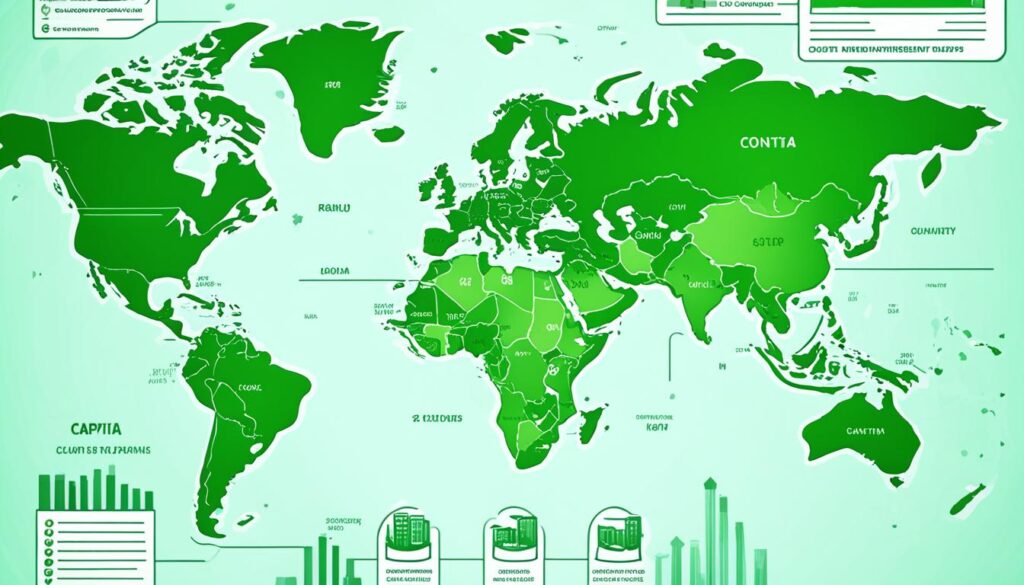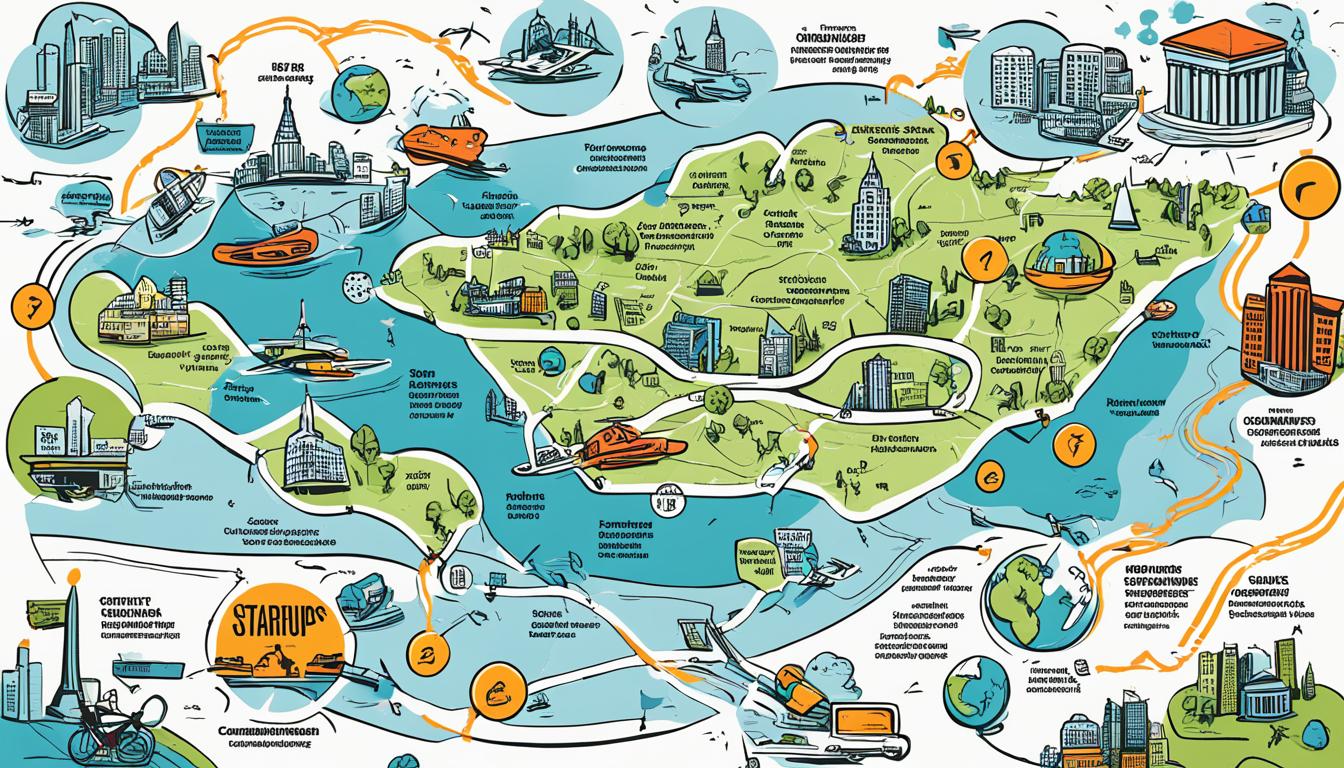Did you realize that nearly $270 billion was invested in U.S. startups last year? That equates to about $800 per person. This significant amount demonstrates the substantial investment going into startups in America, positioning the country as a key player in a global competition that includes nations from around the world. As the global startup landscape expands, understanding the best countries for startups is crucial for entrepreneurs and investors. Let’s explore the top countries that offer robust support, including funding, new infrastructure, and entrepreneur-friendly regulations. This information is sourced from CEOWORLD magazine’s research, which assesses factors such as a country’s investment in its people and research. The findings reveal which locations are excelling in fostering the growth of startups.
Key Takeaways
- The United States ranks first in startup funding with a score of 92 out of 100.
- India holds the fifth position, recognized for its strong Research & Development capabilities.
- The United Kingdom leads in policy dynamics, making it a favorable environment for entrepreneurs.
- Countries like Malaysia and Denmark showcase emerging strengths in the startup ecosystem.
- High per capita investments are seen in Singapore and Israel, indicating strong individual financial support for startups.
The Global Startup Ecosystem Landscape
The global startup scene is constantly changing, with varied funding sources shaping its development. In 2023, North America led with 29.8% of its cities topping the list. This shows its big role in the ecosystem. Europe remained a key player but saw a drop in its ranked cities from 426 to 410, showing the competitive shifts.
Latin America & the Caribbean saw a big rise, from 60 ranked cities to 77, marking a move towards more innovation. The Middle East & Africa also progressed with 63 cities in the top 1,000. These changes highlight the diverse nature of startup activities worldwide.
Many factors impact the startup scene. These include where startups are, venture capital, and government support. In 2023, there was a 58% drop in new unicorns, showing the investment challenges for new startups. Series A funding also fell by 46%, which points out the difficulties in getting early investment.
Despite these hurdles, there are still chances to succeed. Generative AI attracted nearly 20% of all venture capital in 2023, showing what investors are focusing on. European startups made up 42% of the Top 100 Emerging Ecosystems, showing the global link in startup activities. This underlines how critical funding is for the startup world.
United States: The Undisputed Leader
The United States is a top player in startup funding. It has a lively environment for entrepreneurs and a big network of venture capital. This kind of atmosphere helps new projects grow. It also creates lots of investment chances in different areas.
Factors Contributing to U.S. Dominance
Why the U.S. leads in startup funding:
- A strong network of venture capital firms that help startups grow.
- Big investments in research and development lead to new technologies.
- A diverse talent pool comes from top universities and research places.
- The Bayh-Dole Act lets universities keep patent rights, boosting innovation.
In 2023, American venture capital saw about $270 billion go to startups. This breaks down to roughly $800 for each American. This big flow of money shows the country’s dedication to grow. It helps the U.S. stay on top in the world’s startup scene.
Venture Capital Trends in the U.S.
The U.S. venture capital scene is focusing more on early-stage investments. In the first quarter of 2024, investments grew by 33% from the last quarter. This growth happened even though investments had dropped from the year before. During this time, 19 new unicorns showed up, pointing to strong growth in tech companies.
Also, Silicon Valley got a big part of the total investment. Other big cities like New York and Los Angeles followed. A standout point was the 30% increase in large investments over $100 million. This highlights the big-scale investment in U.S. startups.

Analysis of Top Countries for Startup Funding
The Global Startup Ecosystem Index by StartupBlink is important. It shows how countries rank in terms of startup activity. The index looks at many factors like GDP, population, and how much a country supports its entrepreneurs. The U.S. is at the front, with a strong GDP of $25.5 trillion and 333 million people. This shows the U.S. is great at creating startups compared to other places.
Insights from StartupBlink’s Global Startup Ecosystem Index
The U.S. is the top country in these rankings. It highlights the role of big economies and supportive policies for entrepreneurs. Germany and Japan are also doing well, with GDPs of $4.07 trillion and $4.23 trillion. It’s clear that a bigger GDP means a stronger startup ecosystem. This is because larger economies have more money to spend on innovation.
Comparative Analysis of Startup Outputs
When we compare startup outputs, we see differences among the top countries. Although China has a huge GDP of $18 trillion, its startups are not as productive per person as the U.S. Here are the stats for top countries in startup funding:
| Country | GDP (in Trillions) | Population (in Millions) | GDP Per Capita |
|---|---|---|---|
| United States | $25.5 | 333 | $76,399 |
| Germany | $4.07 | 84.1 | $63,150 |
| Japan | $4.23 | 125 | $45,573 |
| United Kingdom | $3.07 | 67.0 | $54,603 |
| Canada | $2.14 | 38.9 | $58,400 |
| China | $18.0 | 1,410 | $21,476 |

This analysis shows how government support and population size matter for startups. North America gets more than half of the world’s startup funding. Different regions have different levels of funding and support. This changes the startup scene around the globe.
Best Countries for Startup Funding
The world of startups is broad, with many countries helping them grow. The United States, Australia, the United Kingdom, and Singapore stand out. They have created great support systems for startups. This has put them at the top of business environment rankings.
Key Players in Startup Funding Globally
In 2023, the United States climbed four positions, proving its dedication to startups. Australia jumped six spots, now ranking second, thanks to funding-friendly policies. The United Kingdom, despite a slight drop, still plays a significant role in the startup world. Singapore soared 43 positions, becoming Asia’s top startup hub. Sweden, Norway, and Germany are also making important contributions to this global scene.
Reasons Behind Their Success
Their success comes from many factors, including:
- Strong regulatory frameworks that promote innovation and startups.
- Access to beneficial funding sources, crucial for tech startups to grow.
- Investment in education to develop entrepreneurial skills and knowledge.
- Robust infrastructure for smooth business operations.
For example, Singapore allows entrepreneurs to set up a business in just three days. This shows its commitment to making things easier for entrepreneurs. Meanwhile, countries like Malaysia and Indonesia have slower startup processes. Knowing these details can help entrepreneurs decide the best place to start their business.

China and India: Emerging Giants
China and India are quickly becoming big names in the world of startups. Each country has its own strengths and issues that make it unique. They’re drawing lots of interest from investors all around the globe.
China’s Impressive Startup Growth
China’s startup scene is booming, thanks to its large population and government support. This country is a big player in technology businesses:
- Mainland China is home to 33% of technology companies in the Asia Pacific area.
- Investments in robotics and automation are changing factories for the better.
- China is at the forefront in Asia Pacific for new economy startups, getting a lot of private investment.
However, it’s not all smooth sailing. China faces challenges like strict rules and a shortage of skilled workers. It’s important to understand this to make the most of China’s bustling startup environment.
India’s Position in the Global Rankings
India now ranks fifth in the global startup rankings. It’s made a solid mark on the entrepreneurial world. Here are the main reasons for India’s growth:
- A young population drives demand for online shopping and digital payments.
- Foreign investments in advanced technology are making a difference.
- More people are getting online, which helps the tech scene thrive.
Even though it faces hurdles such as lower investment per person, India’s future looks bright. It aims to be the world’s third-largest economy by 2030. Exciting developments, like Apple making its latest products in India, show huge potential. These changes will affect not just India but the world.

Other Notable Countries in the Startup Ecosystem
Canada and the United Kingdom are key players in the global startup scene. They have unique strengths that help spur entrepreneurial growth. These countries showcase how different approaches can lead to economic and innovative successes.
The Role of Canada and the United Kingdom
Canada is seeing a boom in startup funding thanks to supportive government policies and vibrant tech hubs such as Toronto and Vancouver. The UK’s startup scene benefits from a strong venture capital market and top-notch academic institutions. These factors drive talent and innovation forward.
In 2023, the UK secured around $32 billion in venture funding, making it a global leader. Canada also made a splash with over $10 billion in venture capital, showing its commitment to entrepreneurship.
Insights on Israel and Singapore
Israel’s startup world shines, thanks to its innovative culture and strong venture capital connections. In 2023, it raised $6 billion in venture funds, showcasing its world-class startups. Singapore, known for its government-driven tech initiatives, aims to climb the global ranks.
This strategic focus has made Singapore’s tech ecosystems crucial for regional growth. It represents a blueprint for others to follow in nurturing entrepreneurial success.

Per Capita Investments in Startups
Per capita investments show how well countries support innovation and business startups. The United States has the highest total investments. Yet, countries like Singapore and Israel stand out in per capita investments. They create a good environment for tech and growth, proving that size isn’t everything.
Understanding Per Capita Metrics
Looking at per capita investment gives a better view of a country’s startup potential. A country might invest a lot, but its per capita investment tells more about its real impact. For instance, the United States’ per capita investment is nearly four times more than the next country. And it’s even more impressive—5.4 times—without factoring in population.
Comparative Investments in Smaller Nations
Smaller countries often do well in per capita startup investments. Take Israel, with less than 10 million people, it’s a top performer. Estonia is another example, leading in Europe with €9,800 per person in 2022, far above the European average. Here are some others:
- Iceland: About €500 per person, over the Europe average.
- Sweden: Roughly €570 per person in 2022, with much of its funding from abroad.
- Switzerland: Nearly €440 per person, raising over €2.2 billion in total.
- United Kingdom: Almost €465 per person, showing a 43% growth in ecosystem value.
- Finland: Around €335 per person, indicating steady investment trends.
These comparisons show smaller nations can compete globally in startups. They excel by playing to their strengths, leading to innovation and entrepreneurship. This approach helps them stand out in the global market.

Barriers and Challenges for Startups Globally
Startups worldwide encounter many hurdles that slow down their growth. It’s crucial for entrepreneurs and policy makers to understand these barriers. Funding issues and lack of infrastructure greatly affect startup success in different areas.
Identifying Key Challenges in Major Markets
Each country faces unique obstacles that limit startups. For example, startups in Europe struggle due to a lack of working capital. Most of their funding comes from the U.S., showing a reliance that hinders local innovation. This shows a wide-ranging issue in global startup culture.
- Market and cultural differences complicate international expansion.
- Legal and regulatory frameworks can be inconsistent and difficult to navigate.
- Limited access to investor networks and resources affects capital influx.
- Cash flow is critical, with approximately 38% of startups failing due to running out of funds.
How Countries Can Improve Startup Ecosystems
Nations can make big changes to better their startup scenes. Simplifying laws and offering tax breaks can help new businesses flourish. Enhancing education in the tech industry is also key. Plus, collaborations between corporations and government can promote lasting growth.
To help startups, countries should:
- Set clear success metrics for international markets.
- Promote team diversity to boost creativity and understanding of different markets.
- Use technology to upgrade financial management and efficiency.
- Make it easier to get funding from both local and worldwide sources.
By taking these steps, significant progress can be made in the startup world. Nations can boost their entrepreneurial success and support a prosperous economy by tackling these challenges.

Future Trends in Startup Funding
Looking into the future, the way startups get funded is changing. More money is expected to flow globally, especially through technological advances and new industry creations. The push towards AI and climate tech shows a big shift. This is because forecasts say tech solutions will lead in the startup world.
Predictions for Global, Startup Investments
Generative AI startups are getting more attention and funding. In the next year, big investors are planning to support these firms a lot. Searches for companies like “Anthropic” jumped over 2,850% since 2019. This shows a huge interest in AI. Also, climate tech startups are becoming popular, with a bigger slice of the investment pie going to them. In 2023, they got over 10% of all startup investments, up from 7.22% in 2020.
The Role of Technology and Innovation
Technology is constantly shaping new business areas, like biotech, which could be worth $1.55 trillion by 2030. The rise in searches for AI drug discovery by 529% since 2019 shows growing interest. As more sectors start using blockchain and AI, new business models will appear. It’s expected that the focus will be on startups that can grow sustainably and be profitable.

Conclusion
As we finish our look at global startup funding, it’s clear that knowing what each country offers is key. This insight helps with your business or investing decisions. Countries like the United States, Singapore, and the United Kingdom stand out with their innovation and strong financial support.
Cyprus and Estonia are creating environments good for new tech companies. They have great tax policies and simple business processes. Meanwhile, the United States keeps its top spot in deep tech. But countries like China and Israel are catching up fast.
These insights on startups show us the current trends and what might come next globally. By understanding the different ecosystems, you can make better investment choices. Take what you’ve learned here to do well in the ever-changing startup world.









